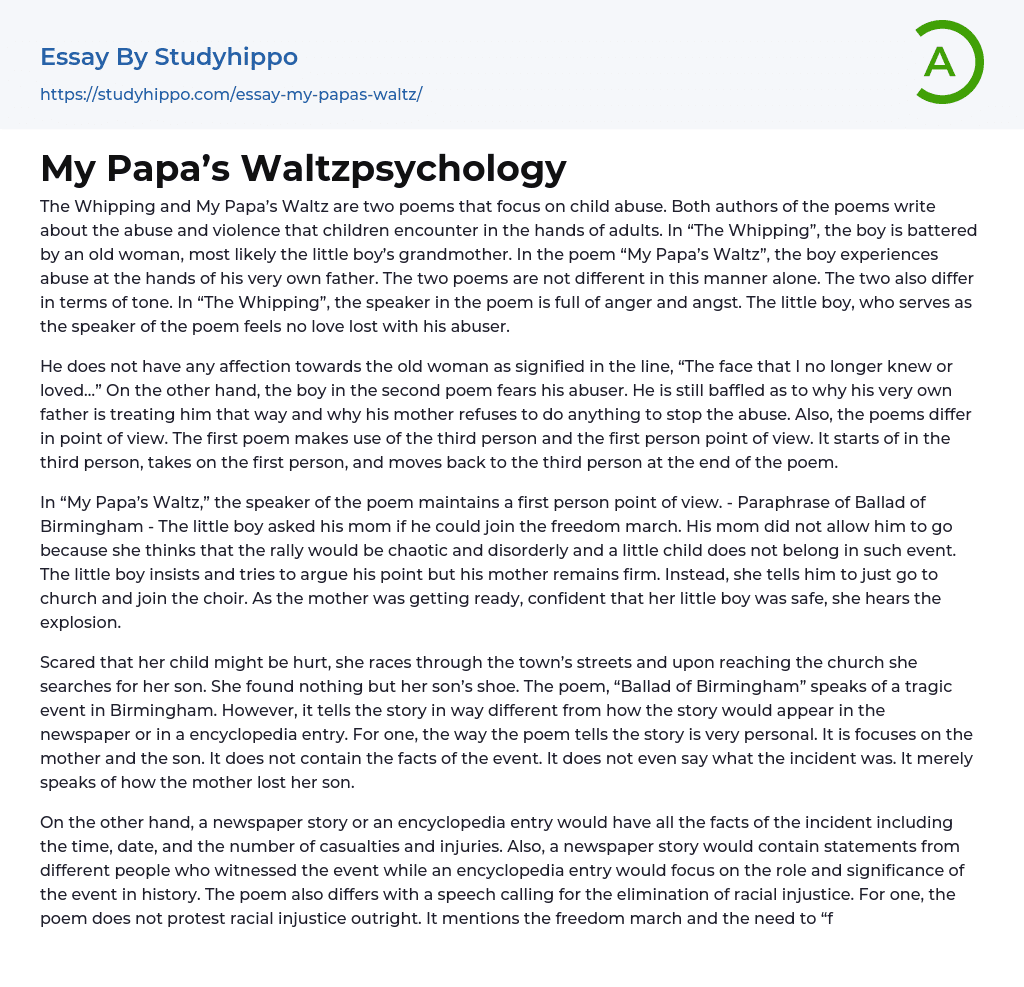Both The Whipping and My Papa’s Waltz focus on child abuse, depicting the violence children endure from adults. In The Whipping, a young boy is battered by an elderly woman, likely his grandmother. Conversely, My Papa’s Waltz portrays a boy being abused by his own father. However, these poems differ not only in terms of the abusers but also in tone. The speaker in The Whipping is filled with anger and angst, while the young boy serving as the speaker feels no love lost for his abuser.
The first poem does not show any affection towards the old woman, as indicated by the line, "The face that I no longer knew or loved..." In contrast, the second poem portrays a boy who is afraid of his abuser. He is confused about why his own father
...treats him that way and why his mother doesn't do anything to stop the abuse. Additionally, the poems have different points of view. The first poem uses both third person and first person perspectives, shifting from third person to first person and back to third person at the end.
The speaker in the poem "My Papa's Waltz" uses a first-person perspective. In a similar manner, the young boy in the Ballad of Birmingham asks his mother if he can participate in the freedom march. However, his mother believes the event will be disorderly and inappropriate for a child. The boy persistently tries to persuade his mother, but she remains steadfast. Ultimately, she advises him to go to church and join the choir instead. As the mother prepares, convinced that her child is safe, she suddenly hears an explosion.<
style="text-align: justify">In fear that her child may be harmed, a mother rushes through the streets of the town until she reaches the church, desperately searching for her son. To her dismay, she only finds her son's shoe. The poem, "Ballad of Birmingham," recounts a tragic occurrence in Birmingham. Nonetheless, it presents the story in a manner distinct from a newspaper article or encyclopedia entry. Specifically, the poem conveys a deeply personal perspective, focusing on the mother and her son rather than providing objective details about the event itself. It simply depicts the mother's heart-wrenching loss.
In contrast, a newspaper story or an encyclopedia entry provides comprehensive details such as the time, date, casualties, and injuries of an incident. Furthermore, a newspaper story includes statements from eyewitnesses, whereas an encyclopedia entry focuses on the event's role and significance in history. In comparison, the poem diverges from a speech that advocates for the eradication of racial injustice. Unlike the poem, the speech directly protests racial injustice. While the poem mentions the freedom march and emphasizes the need to "free the country," it does not explicitly suggest or demand action.
A speech, on the other hand, would call for action and protest against racial injustice. The poem "Ballad of Birmingham" serves not only as a story but also as a means to convey the pervasive presence of evil. The irony of the child's death within the confines of a church amplifies this message by highlighting the lack of safety in any place. Although the mother prohibited her child from participating in the rally due to perceived dangers, it is truly ironic that he ultimately died following
her advice and attending church, a location typically regarded as safe by many.
The poem "Mirror" unifies the author's perspective as a woman battling with reality and searching for self-identity. It highlights the irony of evil existing in unexpected places. The purpose of the poem is to shed light on how women struggle with accepting their aging process and changing appearance. It emphasizes that women often try to conceal or deny their aging, refusing to acknowledge its inevitable progression.
- Abuse Support essays
- Child Abuse essays
- Alcohol Abuse essays
- Physical Abuse essays
- Sexual Abuse essays
- Substance Abuse essays
- Abnormal Psychology essays
- Social Psychology essays
- Developmental Psychology essays
- Jean Piaget essays
- Positive Psychology essays
- Classical Conditioning essays
- Counseling essays
- Psychoanalysis essays
- Educational Psychology essays
- Behaviorism essays
- Authority essays
- Operant Conditioning essays
- Maslow's Hierarchy Of Needs essays
- Mental Health essays
- Personality Psychology essays
- Psychotherapy essays
- Family Therapy essays
- Stanford Prison Experiment essays
- Abraham Maslow essays
- Erik Erikson essays
- Cognitive Psychology essays
- Sigmund Freud essays
- Attachment Theory essays
- Supersize Me essays
- Individual essays
- Infant essays
- Childhood essays
- Adolescence essays
- Growth Mindset essays
- Is Google Making Us Stupid essays
- Childhood Memory essays
- Positive Attitude essays
- Reinforcement essays
- Archetype essays
- Maturity essays
- Deception essays
- Certainty essays
- Conformity essays
- Aggression essays
- Behavior essays
- Human Behavior essays
- Obedience essays
- Adult essays
- Procrastination essays




